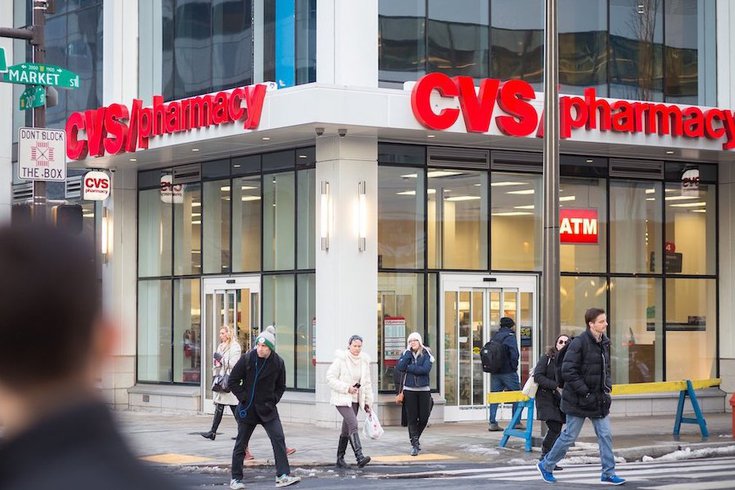
January 04, 2023
 Thom Carroll/For PhillyVoice
Thom Carroll/For PhillyVoice
Retail pharmacies, like CVS, now can offer mifepristone, the first of two drugs needed to complete a medication abortion, under an FDA regulatory change.
Retail pharmacies are now permitted to dispense both pills necessary to complete a medication abortion to people who have a prescription from a certified health care provider.
Previously, only clinics, doctors and some mail-order pharmacies could provide mifepristone, the first of two drugs used in medication abortions. But the regulatory change, made Tuesday by the U.S. Food and Drug Administration, allows retail chains, like CVS and Walgreens, and independent drugstores to fill prescriptions for the drug.
To do so, pharmacies must complete a certification process that includes designating an employee to ensure compliance. But it remains unclear how many pharmacies will choose to offer mifepristone, partly because abortion remains a highly divisive issue in the U.S.
"There have been a lot of different viewpoints over the past few years just with the COVID vaccine," said Lindsay Dymowski, owner of Centennial Pharmacy Services in Fishtown. "We've experienced as an industry people either loving or hating us because we're dispensing a vaccination. So I guess, in a way, COVID prepared us for this."
Dymowski said she hopes to dispense the medication, but was still reviewing the certification process.
"In your inner cities and rural areas, your pharmacy desert-type areas, this service is needed," she said. "As a health care provider, our goal is to provide safe and affordable access to health care. And I don't believe it is our job to morally police anybody."
The nation's two biggest pharmacy chains – CVS and Walgreens – have not offered specifics on whether they will provide the drug.
A spokesman for Walgreens told the New York Times that the company will review the FDA's decision and "continue to enable our pharmacists to dispense medications consistent with federal and state law."
CVS issued a statement to CNN that said the company was reviewing the certification process "to determine the requirements to dispense in states that do not restrict the dispensing of medications prescribed for elective termination of pregnancy."
An official from Danco Laboratories, one of two companies that manufacture mifepristone, told the New York Times that the company expects independent pharmacies to be the first to offer the drug. She noted several logistical hurdles that may make it more difficult the nationwide chains, including company policies dictating that pharmacies keep the names of mifepristone prescribers private.
Abortion pills are used in more than half of pregnancy terminations, according to the Guttmacher Institute, a research group that supports abortion rights.
Due to the fall of Roe v. Wade, it could be illegal or very difficult for pharmacies to offer mifepristone in states that have banned abortions or restricted access.
But the new FDA rules allows pharmacies to ship abortion pills. And a new Justice Department legal opinion clears the U.S. Postal Service to deliver them to states that have enacted strict abortion limits – so long as the sender does not know the drugs will be used unlawfully.
"There are manifold ways in which recipients in every state may use these drugs, including to produce an abortion, without violating state law," Office of Legal Counsel Chief Christopher Schroeder wrote in the legal opinion, posted online Tuesday. "Therefore, the mere mailing of such drugs to a particular jurisdiction is an insufficient basis for concluding that the sender intends them to be used unlawfully."
Mifepristone is only FDA-approved for abortions, but it also is used off-label to treat miscarriages. It has always been held under stricter restrictions than misoprostol, the second drug necessary to complete a medication abortion. Misoprostol, which has many uses, is accessible through a typical prescription process.
Mifepristone, which gained FDA approval in 2000, blocks a hormone necessary for pregnancy development. It is authorized to be taken during the first 10 weeks of pregnancy. Misoprostol, which causes contractions to expel pregnancy tissue, must be taken 24 to 48 hours after mifepristone.
The two companies that manufacture mifepristone, Danco Laboratories and GenBioPro, had asked the FDA to approve a pharmacy certification plan to increase access to the drug.
GenBioPro CEO Evan Masingill called the FDA's decision "a step in the right direction that is especially needed to increase access to abortion care," adding that the company "looks forward to working with prescribers and pharmacies to increase access to medical abortion care for all people."
In December 2021, the FDA began easing restrictions on mifepristone by eliminating the requirement that patients had to obtain the drug in person from a certified health care provider. This allowed patients to receive medical consultations by video, phone or online questionnaires and then receive the prescribed pills by mail.
The FDA has provided a Q&A series to answer questions about mifepristone. Research shows the drug is safe to use. Though bleeding can occur, serious complications are rare, health experts say.